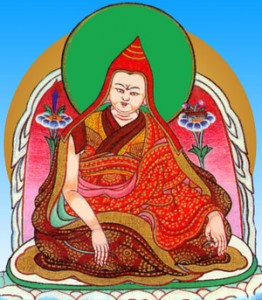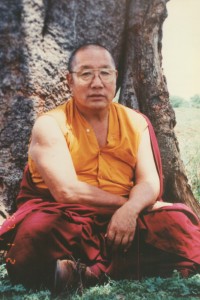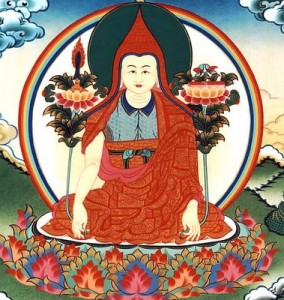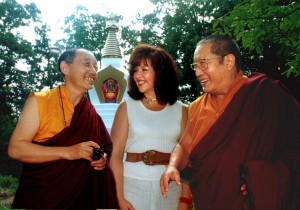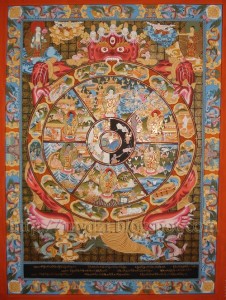
From: “Great Perfection Buddha In the Palm of the Hand: The Lama’s Oral Instructions Upon the Recitation and Visualization of the Preliminary Practices Ngondro” as revealed by Vidydhara Terton Migyur Dorje
PAL KUNTUZANGPO LA CHAG TSHAL LO
I prostrate to the glorious Samantabhadra.
DAL JOR DI NI SHIN TU NYED PAR KA
This precious human birth is extremely difficult to obtain.
CHI DANG CHI LA KYE KYANG MI TAG CHI
All things born are impermanent and must die.
GE WA CHÖ LA BED NA SANGYE GYU
If one perseveres in virtuous Dharma, this is the cause for becoming Buddha.
DIG PA GANG CHE DE TA’I RIG DRUG KHYAM
Whatever negativity is produced will cause one to wander in the six realms.
YI DAG TRE KOM DÜD DRO LÜN PO DANG
Hungry spirits suffer from hunger and thirst, animals from stupidity,
NYAL WA TSHA DRANG MI KYE GE NA CHI
Hell beings from heat and cold, humans from birth, old age, sickness and death,
LHA MIN THAB TSÖD LHA YI DUG NGAL YÖD
Jealous gods from warfare, and even gods (Devas) also have their own particular suffering.
Contemplation on the Precious Human Rebirth
NYAL WA YI DAG DÜD DRO DANG
Birth in the hell, hungry spirit and animal realms, and
LA LO TSHE RING LHA DANG NI
As a Titan and Long-Life God,
LOG TA SANGYE KYI TONG PA
With incorrect view, in a dark eon,
KUG PA DI DAG MI KHOM GYED
Or in an incapacitated state, are the eight states of non-freedom.
MI NYID Ü KYE WANG PO TSHANG
Birth as a human being, in a land where the Dharma is flourishing, and with all faculties complete,
LE THA MA LOG NE LA DED
Without reversed karma, and with faith in the Three Jewels of Refuge
DI NGA RANG GI JOR PA YIN
Are the five personal endowments, which I possess.
SANGYE JÖN DANG DE CHÖ SUNG
Birth during the presence of the Buddha, the presence of the Buddha’s Teaching (Dharma),
TEN PA NE DANG DE JE JUG
The presence of the Doctrine and its pure followers in the world,
ZHEN CHIR NYING NE TSE WA-O
And in the presence of those who lovingly care for others from their hearts, are the five circumstantial endowments.
KYE BU TSHÜL THRIM KANG PA CHAG GYUR NA
If it occurs that the continuity of one’s moral discipline is interrupted,
JIN PE LONG CHÖD DEN YANG NGEN DROR TUNG
Then, even though one may possess material endowments, one will fall to the Lower Realms.
GYATSHO CHER YENG NYA SHING GI
On a turbulent ocean, although a yoke is being tossed about,
BU GAR RU BAL DRIN CHÜD TAR
The chances of an ocean turtle surfacing through the yoke’s center
MI NYID SHIN TU NYED KAR SUNG
Are as unlikely as the extreme difficulties of finding a precious human rebirth.
NGEN SONG SUM NI SA YI DÜL TSAM LA
In the three lower realms, beings are equal in number to the particles of dust on the earth.
MIR KYE WA NI SEN MO’I DÜL TSAM MO
The beings who have a human rebirth are equal to the number of particles on one’s thumbnail.
DAL JOR DI NI NYED PAR SHIN TU KA
This precious human rebirth is extremely difficult to obtain.
KYE BU’I DÖN DRUB THOB PAR GYUR PA LA
Since this accomplishes what is meaningful for man,
GAL TE DI LA PHEN PA MA DRUB NA
If I do not take advantage of this now,
CHI NE YANG DAG JOR PA GA LA GYUR
How will such a perfect opportunity come about again?
Contemplation on Impermanence
SID SUM MI TAG TÖN KA’I TRIN DANG DRA
The three states of transmigratory existence are impermanent like clouds in the autumn sky.
DRO WA’I KYE CHI GAR LA TA DANG TSHUNG
Sentient beings are born and die like the whirl of a dance.
KYE BU’I TSHE DRO NAM KHA’I LOG DRA TE
The lifespan of beings is like a lightning flash in space,
RI ZAR BAB CHU ZHIN DU NYUR GYOG DRO
Or like a waterfall quickly rushing down a steep mountain.
SAG PA KÜN GYI THA DZED CHING
All accumulations become exhausted.
THÖN PO NAM NI MAR TUNG GYUR
All those who are elevated eventually fall down.
THRED PA’I THA NI DREL WA TE
At the end of meeting comes separation;
SÖN PO’I THA NI CHI WA YIN
At the end of life comes death.
SÖD PAR THRID PA’I TSÖN ZHIN DU
Like a prisoner being led to execution,
GOM RE BOR ZHIN CHI DANG NYE
Each step that he takes leads closer to death.
KYE WA YÖD NA CHI WA YÖD
If there is birth, there is death.
DAR WA YÖD NA GÜD PA YÖD
If there is expansion, there is regression.
LANG TSHO DE YANG MI TAG TE
Youth is also impermanent
DAR WA’I DOG KYANG NED KYI THROG
For even illness can steal the dexterity of youth.
TSHO WA’I TSHE YANG CHI WE THROG
The happiness of life is robbed by death.
TAG PA’I CHÖ NI GANG YANG MED
There is nothing of this world that is permanent.
GANG DU NE KYANG CHI WE MI TSHUG PA’I
No matter where one stays, there is no escape from death.
SA CHOG DE NI GANG DU-ANG YÖD MIN TE
There is no direction where death does not exist.
BAR NANG NA MED GYATSHO’I DENG NA-ANG MED
There is no escape in the atmosphere nor in the depths
of the ocean,
RI WO NAM KYI DRAG NA-ANG YÖD MA YIN
Nor is there any escape inside, over the crest of the mountains.
Contemplation on Cause and Effect
LE NAM KYANG NI NA TSHOG LE
All karma is the culmination of various activities.
DE YI DRO DI NA TSHOG JE
Therefore sentient beings possess various types of karma.
LE KYI GYU DRE MED PAR GANG DÖD PA
Whosoever believes that one’s actions do not produce specific causes and results
DE NI MU TEG CHED PAR TA WA YIN
Maintains a nihilistic, atheistic view.
SHI MA THAG TU NAR MED NYAL WAR KYE
At the moment of death, rebirth will be taken in the lowest hell realm.
DE YI RANG PHUNG ZHEN YANG LAG PAR CHED
Such a view is self-destructive and detrimental to others.
ME NI DRANG WAR GYUR YANG SID
It is possible for fire to become cold.
LUNG NI ZHAG PE JIN YANG SID
It is possible to catch wind with a lasso.
NYI DA THANG LA LHUNG YANG SID
It is also possible for the sun and moon to fall to the earth.
LE KYI NAM MIN LU MI SID
It is never possible for the maturation of karma to be deceptive.
KHYÖD KYI DRAM ZE GELONG LHA DANG NI
If for the sake of Rishis (holy men), fully ordained monks,
gods and
DRÖN DANG YAB YUM DAG DANG TSÜN MO DANG
Your guests, the Guru, the consort and royalty,
KHOR GYI LED DU DIG PA MI CHA TE
If you accumulate negative karma in order to serve them,
NYAL WA’I NAM MIN KAL NÖD GA MA CHI
This is also a small cause which produces the ripening result of rebirth in the hells.
DIG PA’I LE NAM CHÖD PA GA YANG NI
Whatever negative karma one accumulates
DE YI MÖD LA TSHÖN ZHIN MI CHÖD DE
Does not ripen instantaneously like being pierced by a weapon.
CHI WA’I DÜ LA BAB NA DIG PA YI
When the time of death arrives, one’s negative karma will
LE KYI DRE BU GANG LAG NGÖN SUM GYUR
Produce the result of exactly whatever was caused.
Contemplation on the Benefits of Virtue
YI GE DRI CHÖD CHIN PA DANG
Composition, offering, generosity and
NYEN DANG LOG DANG DZIN PA DANG
Attentiveness, recitation, memorization and
CHED DANG KHA TÖN CHA WA DANG
Teaching, praying,
DE SEM PA DANG GOM PA TE
Contemplation and meditation
CHÖD PA DI CHU’I DAG NYID NI
Are the ten activities which
SÖD NAM PHUNG PO PAG MED THOB
Generate an immeasurable abundance of merit.
DÜ SU JIN PA JIN CHED NA
If the practice of generosity is consistently performed,
SHI YANG DE NI SHI MA YIN
Such a person may seemingly die, but not an ordinary death,
GYAG ZANG WA YI DRÖN PO ZHIN
Like a traveler who is fully prepared for whatever occurs.
SANGYE CHÖ DANG GENDUN LA
If, for the Buddha, Dharma and Sangha,
PÖ SAM MAR ME CHIG TSAM MAM
Incense or one simple butter lamp,
ME TOG CHIG TSAM CHÖD CHE NA
A flower or anything is consistently offered,
MI YO’I ZHING DER KYE WAR GYUR
Rebirth is taken in the Realm of unmovable Samadhi.
Contemplation on the Faults of Non-Virtue
CHAG DANG ZHE DANG TI MUG DANG
From attachment, hatred and delusion
DE KYED LE NI MI GE WA
Non-virtuous karma is generated.
MI GE WA LE DUG NGAL KÜN
All suffering arises from non-virtuous karma,
DE ZHIN NGEN DRO THAM CHED DO
And likewise, it causes all beings to be reborn in lower realms.
ZHE DANG GI NI NYAL WAR PHEN
Due to hatred one is thrown into the hell realm.
CHAG PE YI DAG JIG TEN DRO
Due to attachment one enters the world of hungry spirits.
MONG PE PHEL CHER DÜD DROR DRO
The usual result of delusion is rebirth as an animal.
DOG PA LHA DANG MI NYID DO
The opposite is rebirth as a god or human being.
Contemplation on the Faults of Cyclic Existence
YI DAG NA YANG DÖD PE PHONG PA YI
Because hungry spirits are so obsessed by desire,
KYED PA’I DUG NGAL GYÜN CHAG MI ZÖD PA
They generate continual, unbearable suffering.
TRE KOM DRANG DANG DRO DANG JIG PA YI
Due to their fear of hunger, thirst, heat and cold,
KYED PA SHIN TU MI ZED TEN TSHAL LO
They manifest these experiences and extreme, unbearable suffering ensues.
YI DAG NAM LA SÖ KA’I DÜ SU NI
During the summer months, all hungry spirits
DA WA TSHA LA GÜN NI NYI MA-ANG DRANG
Experience the moon to be hot and the sun to be cold.
JÖN SHING DRE BU MED GYUR DE DAG GI
Fruit-bearing trees disappear before them, and
TE PA TSAM GYI LUNG YANG KAM PAR GYUR
As soon as they see a great body of water, it evaporates.
KHA CHIG KHA NI KHAB KYI MIG TSAM LA
Some hungry spirits’ mouths are no larger than a needle,
TO WA RI RAB TÖ TSAM TRE PE NYEN
Yet they suffer from the hunger produced by their empty stomachs, the size of Mt. Meru.
MI TSANG GYI NA BOR WA CHUNG NGU YANG
Even though the unclean things we discard are small in comparison,
TSAL WA’I THU DANG NÜ PA MA CHI SO
Hungry spirits do not even have the strength or power to
find them.
DÜD DRO’I KYE NE NA YANG SÖD PA DANG
Animals from birth are raised to be killed,
CHING DANG DEG SOG DUG NGAL NA TSHOG DANG
Undergoing various types of suffering, such as being tied up, whipped, beaten, and so forth.
ZHI GYUR GE WA PONG WA NAM LA NI
All those beings who ignored the peaceful causes of virtue
CHIG LA CHIG ZA DUG NGAL MI ZED PA
Kill and eat one another, experiencing suffering impossible
to bear.
KHA CHIG MU TIG BAL DANG RÜ PA DANG
Some are killed for the pearl they produce, wool, tusk, bone, and
SHA DANG PAG PA’I CHED DU CHI WAR GYUR
Some must lose their life because of their own flesh and skin.
WANG MED ZHEN DAG TSHÖN CHA NÖN PO DANG
Powerless, they are poked by others who possess sharp weapons,
CHAG DANG CHAG KYÜ TAB TE DEG TE KÖL
Whipped and hooked to be put to work by others.
SEM CHEN NYE PA’I LE LA CHÖD PA NAM
All beings who have accrued the karma of harming others
MANG PÖ THIG NAG RAB TU TSHA WA NAM
Will be reborn in the extreme heat of the Black Line Hell Realm,
DÜ JOM NGU BÖD NAR MED LA SOG PA
Wailing in the Hell Realm of Continuous Destruction, or the lowest Hell Realm of all,
NYAL WA NAM SU RAB TU DUG NGAL GYUR
All those in hell will certainly experience extreme discomfort.
DI NA MI CHIG DUNG THUNG SUM GYA YI
For instance, if a man were pierced just now three hundred times with a spear,
RAB TU DRAG TAB DUG NGAL GANG LAG PA
Knowing how incredibly intense the pain would be,
DE NI NYAL WA’I DUG NGAL CHUNG NGU LA
This pain is nothing compared to the suffering in the realms
of hell.
Ö YANG MA YIN CHAR YANG MI PHÖD DO
In fact, it is not possible to try to measure any comparison.
NYAL WA DRI PA THONG DANG THÖ PA DANG
We have seen drawings depicting the hell realms and have heard about them as well.
DREN NAM LAG GAM ZUG SU GYI PE KYANG
Even if we try to contemplate upon them, read or draw an image,
DUG NGAL KYE WAR GYUR NA MI ZED PA’I
The suffering that is felt, in itself, is unbearable.
NAM MIN NYAM SU NYONG NA MÖ CHI GÖ
Is there any question about what it would be like if we were actually experiencing the results of such karma?
DE TAR DUG NGAL SHIN TU MI ZED LO
Thus this kind of suffering is truly beyond our ability to bear.
CHE WA THRAG GYAR NYAM SU NYONG YANG NI
Even if one must experience this for one hundred million years,
JI SID MI GE DE ZED MA GYUR PAR
Until the karma that one previously accumulated is fully exhausted,
DE SID SOG DANG DREL WAR MI GYUR RO
It is simply not possible to end one’s life in that realm!
MI NAM TSHO WA THUNG WE NYAM
The shortness of human life is degenerating.
LHA MIN THAB CHING TSÖD PE NYAM
The quarreling and aggression of Titans (jealous gods) is degenerating.
LHA NAM BAG MED PA YI NYAM
The unconscientious manner of Devas (long-life gods) is degenerating.
KHOR WA KHAB KYI TSE TSAM NA
In cyclic existence there is not even a needle’s worth of happiness,
DE WA NAM YANG YÖD MA YIN
And there never will be.
KHOR WA’I NYE MIG THONG WA NA
When one sees the faults of the state of cyclic existence,
KYO WA’I SEM NI RAB TU KYED
Intense sorrow wells up from within.
KHAM SUM TSÖN RA JIG PE NA
This terrifying jail of the three realms,
TSÖN PA’I SEM KYI PANG WAR CHA
I shall completely abandon with enthusiastic persistence!
(While reciting this, carefully consider the meaning.)
